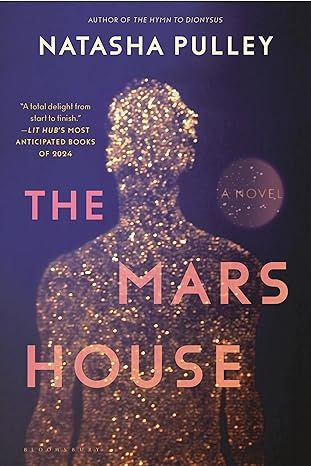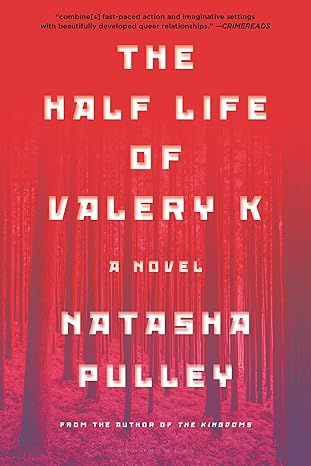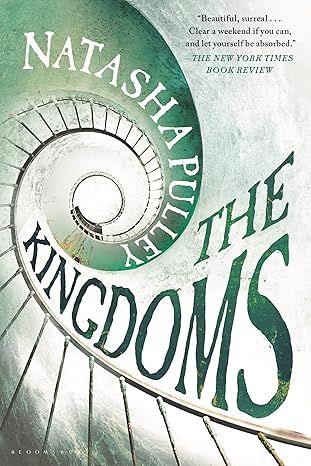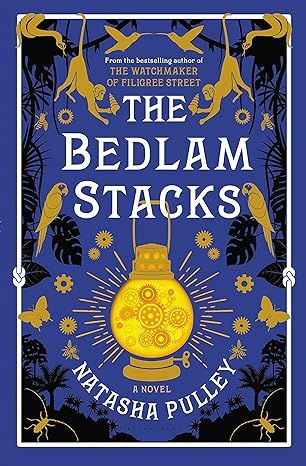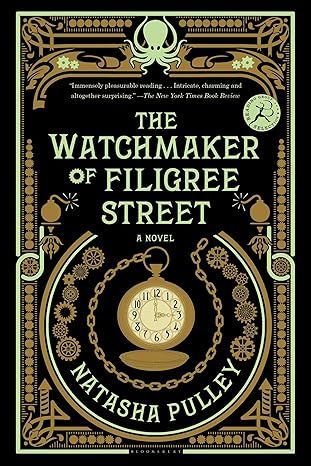The Mars House: A NovelKindle
4.6
-
432 ratings
A compulsively readable queer sci-fi novel about a marriage of convenience between a Mars politician and an Earth refugee.
As Recommended By: Amazon * LitHub * Gizmodo * New Scientist * LGBTQ Reads * Reactor Magazine * KOBO Canada * BookRiot
In the wake of an environmental catastrophe, January, once a principal in London's Royal Ballet, has become a refugee in Tharsis, the terraformed colony on Mars. There, January's life is dictated by his status as an Earthstronger-a person whose body is not adjusted to lower gravity and so poses a danger to those born on, or naturalized to, Mars. January's job choices, housing, and even transportation are dictated by this second-class status, and now a xenophobic politician named Aubrey Gale is running on a platform that would make it all worse: Gale wants all Earthstrongers to naturalize, a process that is always disabling and sometimes deadly.
When Gale chooses January for an on-the-spot press junket interview that goes horribly awry, January's life is thrown into chaos, but Gale's political fortunes are damaged, too. Gale proposes a solution to both their problems: a five year made-for-the-press marriage that would secure January's future without naturalization and ensure Gale's political success. But when January accepts the offer, he discovers that Gale is not at all like they appear in the press. They're kind, compassionate, and much more difficult to hate than January would prefer. As their romantic relationship develops, the political situation worsens, and January discovers Gale has an enemy, someone willing to destroy all of Tharsis to make them pay-and January may be the only person standing in the way.
Un-put-downably immersive and utterly timely, Natasha Pulley's new novel is a gripping story about privilege, strength, and life across class divisions, perfect for readers of Sarah Gailey and Tamsyn Muir.
Read more
Kindle
$9.24
Available instantly
Audiobook
$0.00
with membership trial
Hardcover
$23.17
Paperback
$19.99
Ships from
Amazon.com
Payment
Secure transaction
ISBN-10
1639735305
ISBN-13
978-1639735303
Print length
480 pages
Language
English
Publisher
Bloomsbury Publishing
Publication date
March 17, 2025
Dimensions
6.12 x 1 x 9.25 inches
Item weight
1 pounds
Product details
ASIN :
B0CKHR1HH3
File size :
9406 KB
Text-to-speech :
Enabled
Screen reader :
Supported
Enhanced typesetting :
Enabled
X-Ray :
Not Enabled
Word wise :
Enabled
Editorial reviews
“Delightful . . . The Mars House moves as nimbly as its ballet-dancer hero . . . pivoting toward something that's both nuanced and fresh. The result is both an epic love story and a deft political thriller.” ―The Washington Post
“British bestselling author Natasha Pulley is best known for historical fiction, but in The Mars House, she imagines a world in the future . . . If you love Isaac Asimov and Margaret Atwood for their speculative look at what the future may hold, you won't be able to put down The Mars House.” ―The Globe and Mail
“Already one of my favorite books of the year . . . There's palace intrigue, a slow-burn enemies-to-lovers plot, sassy footnotes, and also there are mammoths! It's a total delight from start to finish.” ―Lit Hub's Most Anticipated Books of 2024
“[A] futuristic blend of science fiction and romance that uses its alien setting to explore . . . climate change, immigration, gender ideology, and political corruption . . . an utterly unique and gently beautiful love story rooted in a complicated exploration of our need for connection and a place to call home . . . the sort of book that will stick with you long after you reach its final page.” ―Paste Magazine
“Pulley astonishes in this thorny and addictive sci-fi romance.” ―Publishers Weekly, Starred Review
“Full of charming details and gender-bending gallantry, this imaginative thriller is a pleasure to read.” ―Kirkus Reviews, Starred Review
“Readers will appreciate all the delightful details of worldbuilding, character arcs, and slow romantic tension. Exquisitely layered and entertaining, Pulley's latest novel is a queer tale of planetary refugees, politics, and populist views (and mammoths).” ―Library Journal
“This book has everything. Intergalactic climate refugees! Slow-burn queer romance! Gender-fluid aliens! Political intrigue with a whiff of murder! Natasha Pulley's newest seems to defy categorization, but I'd venture to guess it'll appeal to fans of Ursula K. Le Guin, N.K. Jemisin, and Mary Doria Russell. Plus, Pulley wrote one of my favorite books of 2015, The Watchmaker of Filigree Street-a twisty-turny steampunky historical fiction tale-that I still think about often. This one promises to be just as thrilling.” ―theSkimm
“The Mars House is narratively compelling . . . and stylistically welcoming, with a wit that tends towards whimsy.” ―Locus Magazine
“Pulley has wrapped an enemies-to-lovers, fake-marriage romance in a fascinating sf-world package . . . Magnetic . . . Charming . . . Readers will have incredible fun reading about this slow-burn romance, the itch of two creepy background mysteries, and a delightful scene involving judgmental mammoths.” ―Booklist
“The novel-set on Mars in a vaguely distant apocalyptic future-will likely be the most immersive, surprising, charming book I'll read all year.” ―Chicago Review of Books
“Absolutely riveting.” ―AudioFile Magazine
“[V]isionary . . . Subverting a tale about creeping interplanetary fascism with the power of profound, even reckless compassion, The Mars House is a dazzling novel about humanity's future.” ―Foreword Reviews
“An incredibly ambitious novel . . . The Mars House is a complex and captivating story.” ―Reactor Magazine
“Few writers combine such warmth and heart with such consummate skill at Natasha Pulley. She sends the reader our into the skies, and deep into themselves, places we never knew we could travel. Reading her is both a joyful and profound experience-and The Mars House is her most daring, ambitious and exciting book yet.” ―Catriona Ward
“[A] captivating and thought-provoking science fiction novel that explores complex themes of identity, belonging, and the human condition in a richly imagined future world . . . Pulley's prose is elegant and engaging, balancing moments of humor and heartbreak with equal skill . . . [A] remarkable achievement.” ―Hidden Sci-Fi
“Natasha Pulley heads to the gulags, then to an atomic village, in her latest to combine fast-paced action and imaginative settings with beautifully developed queer relationships.” ―CrimeReads Queer Mysteries and Thrillers to Read All Year Long on THE HALF LIFE OF VALERY K
“Natasha Pulley builds a surreal world that slowly reveals immense dangers. It's an absorbing Cold War thriller as well as a tribute to courage and determination.” ―Christian Science Monitor on THE HALF LIFE OF VALERY K
“Brilliantly conceived, vibrantly realized, and complexly suspenseful.” ―Booklist, Starred Review on THE HALF LIFE OF VALERY K
“Fans of such stories will be richly entertained by the lavish world-building and breakneck plotting of Natasha Pulley's The Kingdoms…Beautiful, surreal imagery appears throughout the novel, too . . . Clear a weekend if you can, and let yourself be absorbed.” ―The New York Times Book Review on THE KINGDOMS
Read more
Sample
1
London always flooded, had done for decades. People had got the hang of it, moved upward, and started doing scuba diving tours of the lost lower floors for tourists. The jewellers round by Covent Garden kept boats moored at Farringdon Dock1 so they could move their stock fast if the waters rose, and just like they had in centuries past, shops and houses and restaurants had begun to populate the higher Thames bridges. It had become a trinkety sort of place, full of rare book shops and once grand theatres, and locals who were locked in a war with the massive cruise ships that kept knocking the frilly bits off the Houses of Parliament.
When January was little, it had been the sort of place where people came on holiday to see the glittering ruins at Canary Wharf that sank deeper into the river silt every year. He had grown up knowing that the city was sinking, but somehow he’d never thought it would one day be sunken.
April was flood season, and that April was even more determined than the previous ones. The night before everything really fell apart, the rain was already torrential, so he and half the company stayed late at the theatre to put sandbags down at the doors—even though a string of ministers and engineers had been on the emergency broadcasts to say the flood defences would be fine. The Royal Opera House leaned over Seven Dials Canal, which often broke its banks by a good few feet, floating the boats up to the ceilings of their alcoves. Seals had taken over the portico because they knew the kitchen people would be along with yesterday’s sushi soon.
January was enjoying it a lot, though. He didn’t have to use the front door of his building any more; the ferry driver stopped right outside his bedroom window and he just hopped onto the top deck and sunbathed the whole way to work, watching the orange tree blossom rain across the waterways. He did know he might be in trouble once the water rose above his bedroom window, but it was already thirty degrees out and it would not be the end of the world if he had to camp on the roof. He had one of those big umbrellas his mum had used to take fishing, and a camp stove, and an endless pig-headed ability to enjoy himself as long as he personally was mostly dry and he had a camera to take pictures of the dolphins with.
Although some businesses were shut, the theatre wasn’t. As one person, the company had agreed they’d all happily drown before they cancelled the show. It was Swan Lake, for God’s sake; as the director pointed out, cancelling a show about a lake because it was raining would be ridiculous.
So, once the sandbags were down, everyone cracked out the theatre’s supply of candles and matches, set out the big emergency candelabra, put mirrors behind those to make the most of the light—if you were going to go without electricity, there were worse places to work than a theatre—and carried on with the rehearsal.
In all, it had looked fine. Even late that afternoon, it had all looked fine.
January did very much enjoy being the principal of the company—people brought you coffee, and sometimes famous singers wanted you to dance in their music videos—but in his ungrateful moments, he might admit he could have done without being the Swan King. The show run meant he had to lift the not-insubstantial kid playing the prince on one hand four times a day, without collapsing, for the next month. Terry was a wonderful athlete, but if a stranger was asked to guess what he did, they would probably say rugby.2 January was pining for Annie, who had been all of nine stone and who he watched the boxing with religiously after the shows. But Annie was thirty-five and her knee had finally gone, and now; well, now there was Terry.
It was someone’s birthday today. It had been someone’s birthday every day this week, and he watched glumly as Terry skipped past with yet more cake.
“Don’t you judge me,” Terry said, waving the cake at him. “I’m nineteen. I’m a Growing Lad.”
“You’re all right, mate,” January lied, feeling future pain in both wrists.
“Cake?” Terry said brightly.
January wondered about hurling him out the window. The canal was right outside: an enormous walrus-person would surely be fine. “No, thanks. Get some shoes on, we’re starting.”
Terry made a sad face at him but did, at least, go in the right direction.
January leaned against a rail to check his own shoes. You had to break them and superglue them in odd places. He had never worked out why it was that no manufacturer in the world had ever managed to make ballet shoes that just functioned, but they never had, and with rehearsals at fever pitch now, he felt like he was spending half his life with a bottle of glue in his hand, because he was getting through a pair a day. Everyone was; and so he tended to spend the other half of his day unsticking Terry from rails or props, or once, the assistant director.
Come the performances, it would be two pairs a day. In the back of the changing room, there was a scrap heap of them. Sometimes he studied the wrecked leather and thought about what that same pressure and force were doing to his own joints. Thirty-one was getting on for a dancer, it really was, and he had been phenomenally lucky to have had no major injuries yet. He could feel it coming, though.
He had no idea what to do when it did. If you were lucky, you moved into choreography and director roles, but that wasn’t going to happen, not in London. The major theatres were in Russia. The ballet boarding schools often wanted people. Beijing, maybe, or one of the megaschools in Saudi Arabia where the solar barons sent their kids. It was a yawning pit just waiting for him, and he had an acute sense that he was already balancing on the edge. He had to keep reminding himself that he had been lucky to do this for so long—or at all—that it wouldn’t kill him to teach, that he had always known he would only be able to dance until, at the outside best, he was forty.
Only it was still horrible. It was horrible to have found the one thing you were made to do, to be one of the best in the world at it—and to know you could do it for only a few years. It wasn’t that other things wouldn’t be all right. One of the Saudi schools would be fantastic. Imagine, the sensible voice in the back of his mind said (he always assigned it to the Swan King, who struck him as a pragmatic sort of person), living in a city that’s entirely pedestrian, which isn’t flooded, where they put all their roads and cars underground, and where every scrap of cloth, from the market canopies to the visor of your cap, is solar panelling to fuel the air conditioning. Imagine not wearing waders to buy groceries.
It would just never be this. He would never be this good again, never be this strong, and he knew what he was like. Logically he’d be proud of what he’d done, but he wouldn’t feel proud. Future January would feel ashamed to be so much less than Past January.
The director was clapping for attention. “All right! From the top of the pas de deux.”
However much January did not enjoy Terry, he loved these candlelit rehearsals in the twilight of flames and mirrors. They could have been anywhere, in any time; Italy in the nineteenth century, Paris before that. It meant belonging in a tradition eight hundred years old—a tempestuous, brutal one that slung you out with nothing at the end except arthritis, but just for now, it was still his. He loved the flex and give of the stage. He loved how, once you had trained to the highest peak of fitness you could go, even launching yourself five feet into the air was effortless, how there was a moment when you floated.
“Guys!” the orchestra conductor shouted. She always stayed as long as they did, even after the musicians had gone home; she played the violin for them because she insisted no dance company should rehearse to anything but live music. She had just gone out for a cigarette. “The foyer’s two feet deep in water and I think it’s got into the electrics. There’s a lot of dead fish in there and I got sparks when I dropped some foil on the surface.”
There was a hush, because that meant nobody would be able to go home.
“What’s the matter?” the director said. “We’ll camp in the changing rooms. Lovely big sleepover.” Even she didn’t seem thrilled with the idea of having to spend all night in proximity to Terry.
January wondered what he was going to do about his contact lenses. He was spectacularly shortsighted without them, and not having expected to stay the night, he hadn’t brought a case or the solution for them. The last time he’d kept them in overnight by accident, he’d ended up in hospital being told off by a doctor.
“Water’s rising, mind you,” said the conductor.
He didn’t sleep much, not because he was worried about the flood, but because nobody had any saline solution and he had to throw away his lenses. He wasn’t sure how he was going to get home half blind. He lived in Hackney, which was over the far side of the city, and he hated the idea of asking anyone to help him get there. Most of the company were just like Terry; still children really, and though everyone was incredibly kind, it was asking too much.
He jolted awake, because somewhere close by on the canal, a lonely flood siren was going off, but muffled; he had a feeling that the angry lady who ran the coffee shop on the corner had stuffed a tea-towel in it.
He got up carefully. Everyone was asleep on the floor, bundled up in nests of blankets and cushions stolen from the nice seats in the auditorium. He skirted the edge of the room, not at all able to tell if he was about to step on a person or just a suggestively shaped ball of bedding. When he got to the window, he had to stare for a long time to put together what he was seeing, blurred as it all was.
The canal water was right below the window. Covent Garden had flooded up to the second floor, and all around it, people were sitting on roofs.3
It was still raining. Opposite, a man he usually only ever saw dressed in a suit, getting cross into a phone at the café, was sitting on a fold-up chair under a bivouac, cooking something on a gas stove.
A puffin was sitting on the windowsill, looking just as interested to have found a January as January was to have found a puffin. Puffins were always much tinier than he imagined, and the markings on their faces made them look sad, but this one seemed cheerful. It had some fish. It must not have minded people, because it waddled across to sit by his arm. He was wearing black; maybe it thought he was a giant puffin.
In a bright orange canoe, just opposite him on the canal, Always Angry Lady from the café lifted a hand. He only knew it was her because she always wore the same yellow headscarf.
January waved. “Hi. Anything on the news?”
“Horrible disaster, emergency services in crisis, everyone at Westminster’s fucked off to fucking Manchester,” she said.
“Right. Where are you off to?” he asked, in case it was a sensible idea everyone here could copy.
“See if I can get a boat out to Peterborough.”
He didn’t know anyone in Peterborough. With a lurch, he realized that he didn’t know anyone anywhere but here. His mum’s vineyard in Cornwall had been sold to a French family with a poodle and triplets. They knew him by sight, because her grave was on the edge of the land and he visited it sometimes, but that was it.
“Good luck,” he said.
“Fuck it all,” she said, and paddled off.
He jumped when, somewhere over the rooftops, something exploded. It was a deep bang that juddered the skeleton of the building. The puffin jumped too, and whirred away.
The conductor touched his shoulder. “Internet’s gone,” she said. “I think we need to get out and find out what’s going on. And some food. There’s twenty-five people here.”
“How?”
She pointed downwards. There was a lost rowing boat bumping against the wall. After a murmured discussion with the director, they climbed down into it, January to row and the conductor to navigate.
Without much hope, they tried supermarkets first. Everything was flooded. The front doors were underwater. They had to give up. Instead, they concluded that what was needed was to find some people who might know what was going on or where you could get help.
As always, there were beacon lights punching up to the storm clouds above St Paul’s Cathedral, and hologram signs to say that you could find shelter there if you had nowhere else. It would have news screens too. The two of them hesitated, because it was a long way to row, but it was downriver and the current would carry them toward the cathedral, at least.
By the time they guided the little boat up to the great bulk of the cathedral, January’s hands were raw, even where he had wrapped his sleeves over them. Away from the silt of the Thames, the water here was very, very clear, and blue; he could see right down to the ancient steps, thirty feet below the hull.
Plenty of other people had had the same idea, and the way in was crowded—the vast doors formed a bottleneck as people had to slow down to duck under the arch of the portico—but it was eerily quiet. The only voices came from the high screens projecting the news down into the gloom of the aisle, and the thousands of little boats floating there. The muted light from the stained glass windows patterned people and water in colours. January and the conductor eased their boat into a space close to a statue of a saint which, when it had been set there, must have been twenty feet above the ground. Now, the water rippled around the hem of its robe.
The news was being projected around the inside of the great dome. Although there were speakers everywhere, it was hard to hear; the echoes were so severe it all sounded as though everything was being said twice, half a second apart.
The conductor, who had been standing up to direct him, sat down next to him now on the bench. In the boat next to theirs, an exhausted-looking man lifted his tiny daughter out to sit at the saint’s feet.
“. . . emergency restrictions banning all travel. Flooding is widespread beyond the capital, presenting a significant danger to life. The national rail network has suspended services across the south and south-east. The Prime Minister, who was evacuated to Manchester late last night, has pledged emergency aid to the capital as soon as possible.”
As soon as possible didn’t sound very soon.
On the way back to the theatre, the two of them broke into the top floor of a camping shop and stole gas stoves, torches, batteries, and everything else they could think of that might be useful. They found a supermarket on the upper floor of a shopping centre too, open and crowded, shelves emptying fast. He waited, tense, in the boat while the conductor hurried in, because he had watched someone tip a girl out of her boat into the water to steal it two minutes before. Perhaps he looked big enough to be trouble, or perhaps there were just better boats around, but nobody tried anything. The sky was grey and quiet. Very quiet. There were no helicopters.
Read more
About the authors
Natasha Pulley
Natasha Pulley was born in Cambridge. She read English Literature at Oxford before doing an MA in Creative Writing at the University of East Anglia. In 2013 she went to Japan on a scholarship from the Daiwa Anglo Japanese Foundation. She lived in Tokyo for a year and a half, learning Japanese and researching her first book, 'The Watchmaker of Filigree Street'. She spent several months in Peru courtesy of a travel grant from the Society of Authors, chasing llamas and researching 'The Bedlam Stacks', and more recently, spent some time in Shanghai studying Mandarin for 'The Mars House'. She lives in Bristol.
Read more
Reviews
Customer reviews
4.6 out of 5
432 global ratings
Novel Ninja
5
Read this. seriously.
Reviewed in the United States on May 17, 2024
Verified Purchase
Natasha Pulley is always great, and this book is fantastic. It took a turn at some point and I didn’t see it coming. The world building (almost literally) was magnificent. If you’re worried about it being sci-fi…don’t. It’s not, really.
LadyCaterina1121
5
An love story like no other
Reviewed in the United States on March 21, 2024
Verified Purchase
Natasha Pulley is my favorite author so I had extremely high expectations for the Mars House. Even they were exceeded! The Mars House is at heart a love story in the purest sense. The love and trust that can grow between two people, between groups of people united for a common goal of survival, and what really makes a family. January Stirling, principal dancer, must flee London when it floods and becomes unlivable for good. The only place willing to offer a place to live is a settlement on Mars. But Mars is not some glowing paradise either. The residents of Mars have been genetically altered to live in the lower gravity of Mars and regard humans straight from earth as dangerous because of their greater strength. On Mars, Earthstrong humans must wear cages to keep from accidentally hurting their lighter-gravity counterparts and are very much second-class citizens. Unless of course they’re willing to undergo experimental surgery and other treatments designed to naturalize them to Mars. This has many drawbacks, including loss of mobility that may be permanent, and one big benefit: citizenship and healthcare and universal basic income. One of the loudest voices for making naturalization mandatory is Senator Aubrey Gale, who was injured in a protest that turned into chaos and a riot by, you guessed it, an Earthstrong person. So when they and their publicity department tour the plant that January must do manual labor in just to survive, an off-hand remark January is goaded into saying leads to him being imprisoned for hate speech and when he’s finally freed his choices are bleak. Senator Gale’s political opponent from a rival House points out that they casually destroyed a man’s life for a sound bite and they’ve had no idea and given him not a second thought. Aubrey’s solution is literally the last thing anyone would expect. They propose a marriage of convenience to January for the next five years, and at the end of it, January will be free and wealthy, and not need to naturalize and give up the ability to dance. The catch? His entire life will be broadcast constantly to all of Mars. The Senator is terrified of all Earthstrong people. Oh, and the last fiancé went missing along with the Senator’s twin. What could possibly go wrong? Just about everything, and that’s just the beginning. But along the way, can Audrey and January forge a friendship and true partnership out of their sham marriage? And yes, if you’ve been reading Natasha’s social media, I can confirm that there are in fact mammoths. Along with a giant husky named Kasha. Please read this wonderful story!
Read more
3 people found this helpful
JB
5
Awesome
Reviewed in the United States on April 29, 2024
Verified Purchase
Natasha Pulley is brilliant. Read her books at least twice. Read through first to see what happens next. Read through the second time to appreciate her dexterity with language. She weaves universal problems seamlessly into her unique plots.
Liblady
5
Satisfying read
Reviewed in the United States on April 28, 2024
Verified Purchase
Sci-fi with different gender norms providing the setting for the story, along with humans genetically modified to exist on Mars. Tension exists between normal earth humans and the mars residents for very varied reasons; but the underlying theme is about the commonality of humanity…. There’s a bit of mystery and perhaps some parallels to current events.
I am often guilty of abandoning books when pronouns depart from standard usage, but thoroughly enjoyed this read and recommend it to anyone tired of fluffy SF
Read more
mare
5
Sunshine out of darkness.
Reviewed in the United States on April 19, 2024
Verified Purchase
I recommended this book to a friend, and she read the description and said it sounded pretty intense and dark. Objectively speaking, probably so. But I found myself really enjoying how the main character liked people, and was so caught by whimsy and the sheer quirky oddities of life. His perspectives and moments of joy leavened what could have been a weighty and grim story. The footnotes were also so much fun…
In addition, I liked how this book made me think about language and how it evolves, and how it reflects a culture. It also made me think about strength and power. And it made me consider how complacent we are in our first world countries with our many advantages and protections against dangers others less fortunate are exposed to constantly. Made me shift uncomfortably to imagine a time when we might be the third world, disadvantaged people.
Highly recommend.
Read more
2 people found this helpful
Top Natasha Pulley titles
View allBest Sellers
View all
The Tuscan Child
4.2
-
100,022
$8.39

The Thursday Murder Club: A Novel (A Thursday Murder Club Mystery)
4.3
-
155,575
$6.33

Sapiens: A Brief History of Humankind
4.6
-
140,302
$13.49

The Butterfly Garden (The Collector, 1)
4.3
-
88,556
$9.59

Things We Hide from the Light (Knockemout Series, 2)
4.4
-
94,890
$11.66

The Last Thing He Told Me: A Novel
4.3
-
154,085
$2.99

The Perfect Marriage: A Completely Gripping Psychological Suspense
4.3
-
143,196
$9.47

The Coworker
4.1
-
80,003
$13.48

First Lie Wins: A Novel (Random House Large Print)
4.3
-
54,062
$14.99

Mile High (Windy City Series Book 1)
4.4
-
59,745
$16.19

Layla
4.2
-
107,613
$8.99

The Locked Door
4.4
-
94,673
$8.53
